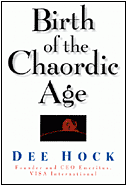What do the Internet, Alcoholics Anonymous, and Visa International, the organization that brings us the Visa card, all have in common?
You can find them just about anywhere on earth, that’s one common thing. They have not spread through unrelenting market push, like Coca-Cola. Rather they are pulled by demand, because they meet real needs very effectively. They serve their purposes successfully year after year without any obvious headquarters, no glittering center of power, no centralized command. No one owns any of them. Visa does $1.25 trillion worth of business a year, but you can’t buy a share of it.
Dee Hock, who founded Visa, would say these are all chaordic organizations. He made up that word by combining “chaos” and “order.” Chaordic organizations are self-organizing and self-governing. They operate not through hierarchies of authority, but through networks of equals. It isn’t power or coercion that makes them effective; rather it’s clear shared purpose, ethical operating principles, and responsibility distributed through every node.
It’s in the interest of every computer owner hooking onto the Internet to be sure that no one messes up the functioning of the Internet. It’s in the interest of every alcoholic to know there will always be a place to turn for help. It’s in the interest of every card-issuing bank, card-accepting merchant, and card-using customer to know that payments will go through, accounts will be kept accurately, bills will be paid. Chaordic organizations, like any organizations, may be abused by the incompetent or the criminal, but they have astounding powers of self-policing and self-repair.

In his new book Birth of the Chaordic Age, Dee Hock tells three stories at three levels: his own life story, the story of Visa, and a profound story about human institutions.
Raised in a Mormon family in Utah, Hock developed a strong aversion to central control. Brought in to save the failing Bank Americard system, he envisioned, years before electronic funds transfers, an organization that “could guarantee, transport, and settle transactions twenty-four hours a day, seven days a week, around the globe.” That was the function of a bank, but far beyond the power of any single bank. “It would require a transcendental organization linking together in wholly new ways an unimaginable complex of institutions and individuals.
“At the time did I think it could be done? No! Did I think the Bank of America would give up ownership? No! Did I think banks worldwide could be brought together in such an effort? No! Did I think laws would allow it? No! But did I believe it was what ought to be? Ah, that was another question indeed!”
By now we take credit cards for granted. It’s worth imagining for a moment the network of organizations and the flow of information that allows all those purchases to be billed correctly to all those customers with all those banks guaranteeing that all those merchants will be paid, in any currency, anywhere in the world. What holds it together is a set of principles (merchants don’t pad the bill, banks don’t withhold payments, customers pay up) and above all a purpose.
The purpose is “what ought to be.” Hock says it’s the hard part of any chaordic alliance, getting the purpose right, making it consistent with real need, with the laws of the planet, with the mysteries of life. Purpose is derived from morality, from vision, from collective wisdom, not from individual ambition or greed. That, says Hock, is where the whole industrial system, including both corporations and governments, has gotten so far off track.
“Life is not about controlling. It’s not about getting. It’s not about having. It’s not about knowing. It’s not even about being. Life is eternal, perpetual becoming, or it is nothing. Becoming is not a thing to be known or controlled. It is a magnificent, mysterious odyssey to be experienced.
“At bottom, desire to command and control is a deadly compulsion to rob self and others of the joys of living. … Is it any wonder that a society that worships the primacy of measurement, prediction, and control should result in destruction of the environment, maldistribution of wealth and power, mass destruction of species, the Holocaust, the hydrogen bomb, and countless other horrors? How could it be otherwise, when for centuries we have conditioned ourselves with ever more powerful notions of engineered solutions, domination, compelled behavior, and separable self-interest?
“Money, markets, and measurement have their place. They are important tools indeed. We should honor them and use them. But they are far short of the deification their apostles demand of us, and before which we too readily sink to our knees. Only fools worship their tools.”
Strange talk for a banker.
Hock retired from Visa, with no stock options, no fortune, intending just to enjoy nature and his grandchildren. But the depredations of the non-chaordic institutions of the world pulled him back into helping other groups envision transcendent purposes and put together non-hierarchical organizational structures.
He is working with East Coast fishers, who have managed to collapse their own resource, to form the Northwest Atlantic Marine Alliance. After a year of discussion, it has defined its purpose: “to restore and enhance an enduring Northwest Atlantic marine system that supports a healthy and diverse abundance of marine life and commercial, recreational, aesthetic, and other uses.”
Strange talk for a bunch of fishers.
He is trying, with representatives of the increasingly dysfunctional U.S. health care system, “to create a new concept of organization that will enable all individuals to have access to the information, assistance and resources necessary for them to achieve their optimum health.”
Wow! Isn’t it great to hear someone articulating and taking seriously the challenge of creating what ought to be?


